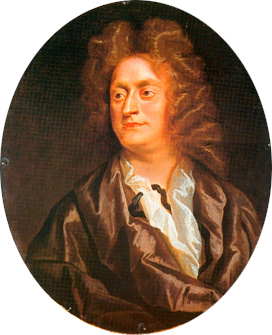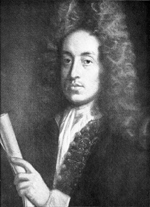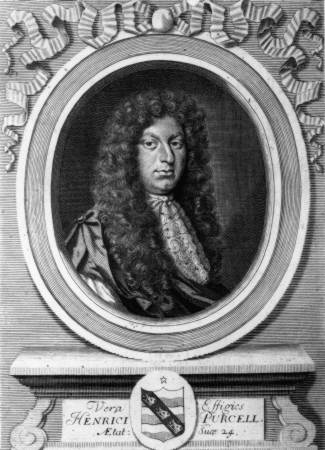

English composer. Little is known of his life, and his parentage remains unclear, although it is certain that he had three brothers: Edward, Daniel, and Joseph. As a boy Henry was a chorister in the Chapel Royal, where he presumably studied with Cooke, Humfrey, and Blow; at the age of eight he contributed a three-part song to Playford's Catch That Catch Can.A second early work, written in 1670 and now lost, was recorded as an "Address of the Children of the Chapel Royal to the King, and their master, Captain Cooke ... composed by Master Purcell, one of the Children of the said Chapel." After his voice broke in 1673 he became assistant to John Hingeston, who was in charge of keeping the royal instruments in repair.
Purcell became the organ tuner at Westminster Abbey (1674-78), succeeded Matthew Locke as composer-in-ordinary for the violins in 1677, and was appointed organist of Westminster Abbey in 1679. In 1682 Purcell succeeded Edward Lowe as an organist at the Chapel Royal, and the following year, after Hingeston's death, was appointed organ maker and keeper of the king's instruments. Purcell's funeral took place in Westminster Abbey on November 26, 1695.
 Purcell is one of the greatest of all English composers and an outstanding figure of the Baroque period. He first became involved with the theater in 1680, most of his dramatic music consisting of overtures, entr'actes, dances, and songs; five works constitute what have been designated "semi-operas," with more substantial amounts of music. Dido and Aeneas is exceptional in that the libretto is set to music throughout; it was written for a boarding school -- Josias Priest's "School for Young Gentlewomen" -- at Chelsea in 1689. Purcell's first court odes and welcome songs also date from 1680, and continue throughout his career; best described as cantatas for solo voices, chorus, and orchestra, they represent some of his finest music.
Purcell is one of the greatest of all English composers and an outstanding figure of the Baroque period. He first became involved with the theater in 1680, most of his dramatic music consisting of overtures, entr'actes, dances, and songs; five works constitute what have been designated "semi-operas," with more substantial amounts of music. Dido and Aeneas is exceptional in that the libretto is set to music throughout; it was written for a boarding school -- Josias Priest's "School for Young Gentlewomen" -- at Chelsea in 1689. Purcell's first court odes and welcome songs also date from 1680, and continue throughout his career; best described as cantatas for solo voices, chorus, and orchestra, they represent some of his finest music.  As a chorister he was acquainted with the previous generation of church music, as well as the modem anthem style with extensive solo verses and string accompaniment; he probably was writing anthems for the Chapel Royal as early as 1679, and after his 1682 appointment abandoned the full anthem in favor of the verse form. Purcell's secular vocal output is immense and includes, in addition to the nearly 150 songs from dramatic works, an additional 100 works (many published in contemporary songbooks) as well as numerous duets and catches. His instrumental music includes works for harpsichord and organ, as well as chamber music for viol consort or the more modem combination of two violins, bass viol, and keyboard continuo. Aside from Purcell's contributions to anthologies and some popular songs from stage works, few of his compositions were published during his lifetime. The most notable exception is the Sonnata's of III Parts: Two Viollins and Basse: to the Organ or Harpsecord(London, 1683; 2nd ed., 1684), which includes a portrait of the composer. In 1697 his widow published the Ten Sonata's in Four Parts.
As a chorister he was acquainted with the previous generation of church music, as well as the modem anthem style with extensive solo verses and string accompaniment; he probably was writing anthems for the Chapel Royal as early as 1679, and after his 1682 appointment abandoned the full anthem in favor of the verse form. Purcell's secular vocal output is immense and includes, in addition to the nearly 150 songs from dramatic works, an additional 100 works (many published in contemporary songbooks) as well as numerous duets and catches. His instrumental music includes works for harpsichord and organ, as well as chamber music for viol consort or the more modem combination of two violins, bass viol, and keyboard continuo. Aside from Purcell's contributions to anthologies and some popular songs from stage works, few of his compositions were published during his lifetime. The most notable exception is the Sonnata's of III Parts: Two Viollins and Basse: to the Organ or Harpsecord(London, 1683; 2nd ed., 1684), which includes a portrait of the composer. In 1697 his widow published the Ten Sonata's in Four Parts.
Works:
Operas and semi-operas: Dido and Aeneas (London, 1689); The Prophetess, or The History of Dioclesian(London, 1690); King Arthur, or The British Worthy(London, 1691); The Fairy Queen(London, 1692); The Indian Queen(final masque by D. Purcell; London, 1695); The Tempest, or The Enchanted Island(London, ca. 1695).
Plays with incidental music and song: Over 40 works, including Theodosius, or The Force of Love(1680); The Double Marriage(1682- 85?); A Fool's Preferment, or The Three Dukes of Dunstable(1688); The Gordian Knot Unty'd(1691); The Wives' Eycusc, or Cuckolds Make Themselves(1691); Oedipus(1692?); Timon of Athens(1694); Bonduca, or The British Heroine(1695); The Rival Sisters, or The Violence of Love(1695).
Other secular music includes over 100 solo songs, over 50 songs for two or more voices and continuo, over 50 catches.
Anthems and services: Over 60 works, including "Behold, I bring you glad tidings" (1687); "Blessed are they that fear the Lord" (1688); "Hear my prayer, O God" (before 1683); "In thee, O Lord, do I put my trust" (ca. 1682); "in the midst of life" (two versions, before 1682); "I will love thee, O Lord"; "My beloved spake" (before 1678); "My heart is inditing" (1685); "O God, thou art my God" (ca. 1680-82); "O sing unto the Lord" (1688); "Who hath believed our report?" (ca. 1679-80).
Other sacred works: Approximately 40 works for various vocal combinations, including "Ah! few and full of sorrow" (ca. 1680); "Awake, ye dead" (1693); "Great God and just" (1688); "Lord, what is man?" (1693); "Miserere mei" (1687); "O Lord our governor" (ca. 1680); "With sick and famish'd eyes" (1688).
Numerous odes and welcome songs: Instrumental music, including fantasias, overtures, pavans, harpsichord suites, airs, hornpipes, overtures.